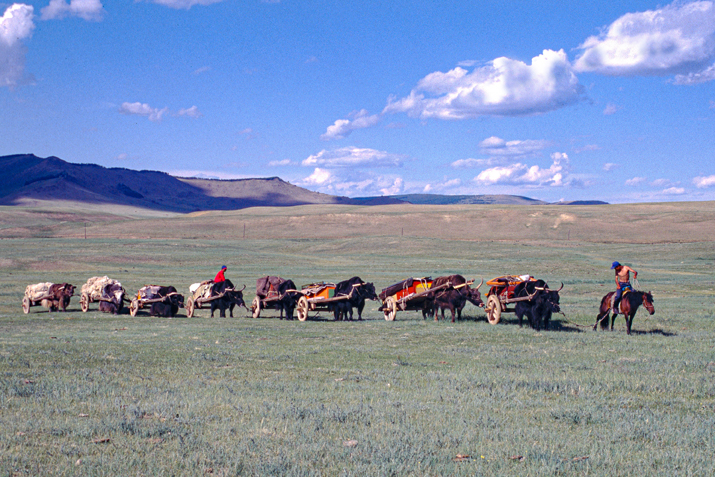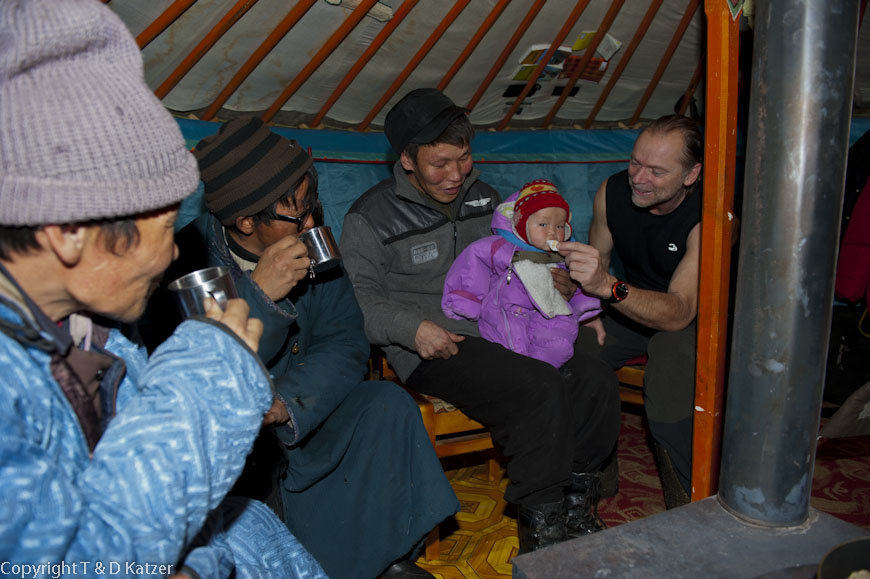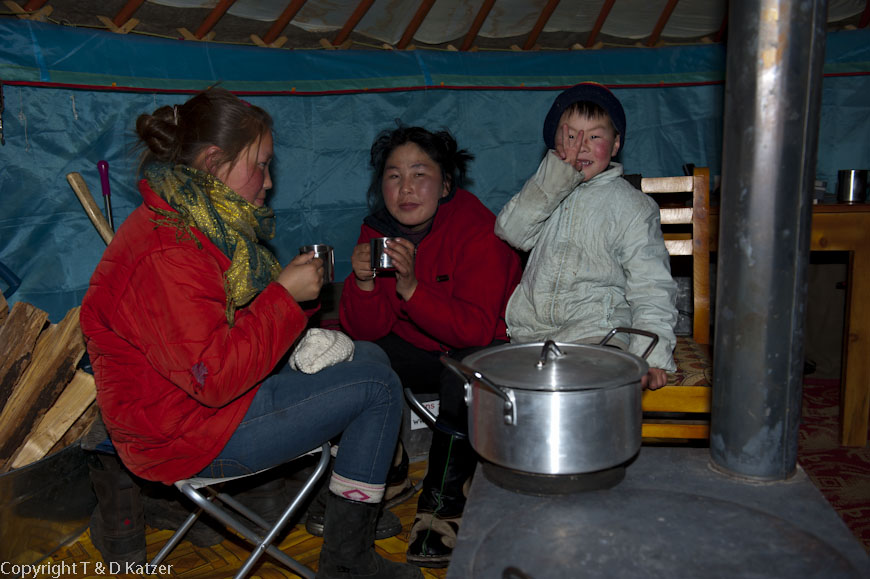
Cursed by the shaman
N 51°33'336'' E 099°15'341''
Day: 158
Sunrise:
09:28
Sunset:
17:20
Total kilometers:
1281
Soil condition:
Ice, snow
Temperature – Day (maximum):
minus 17°C
Temperature – day (minimum):
minus 25°C
Temperature – Night:
minus 31°C
Latitude:
51°33’336”
Longitude:
099°15’341”
Maximum height:
1981 m above sea level


In the late morning we get another visitor. 33-year-old Hadaa brings his baby to show us with pride. Today he is accompanied by 37-year-old Tso and Huchee, who is about the same age. For a better understanding of who lives in which tipi or log cabin, we have now numbered the dwellings. The Tuwa camp currently has a total of seven tipis, two log cabins and our yurt. Hadaa lives with his young wife and his baby Undraamaa in tipi 4, Tso lives with the shaman Saintsetseg and her 20-year-old daughter Monkoo in tipi 7 and Huchee shares tipi 2 with his brother Galaa and sister Mama.
“What do you want to drink, tea or coffee?” asks Tanja. “Coffee!” is the unanimous answer. We talk as much as our Mongolian allows. We tell the men that we rode our horses from Erdenet to Mörön and on to Tsagaan Nuur. They understand, give us the thumbs up and laugh. “Hm, amttaj” (“tasty”), they praise the coffee. As with every visit to Tuwa so far, they don’t stay longer than 20 or 30 minutes. Then they thank us politely and say goodbye. “Irj irj baigaarai”, (“Come whenever you want”, says Tanja as usual, to signal to our guests that our yurt is always open for them and that we are very happy to offer coffee, tea and pastries. “Bairlalaa”, they thank us politely.
In the evening we enjoy Tsaya and Ultsan. By now we are more familiar with each other and our meetings are becoming more and more relaxed. Tsaya tells us how she was brought to America by her parents as a young girl. “My parents emigrated to America two years before us to earn money. At that time, the economic situation in Mongolia was a disaster. After two years, my parents had saved enough money for us children to join them. When we got there they served everything America was known for. Hamburgers, donats, chips, ketchup etc. We ate until our bellies were almost bursting. I spent part of my childhood and my entire youth there. Then it became increasingly difficult for my parents to find work. They sold everything they had just in time and moved back to Mongolia. Friends of ours waited too long and now can’t even afford the plane ticket to get home. I’ve already told you how I ended up here with the Tuwa.
Well, as you know, I fell in love with Ultsan. We have been an inseparable couple ever since. We saved up for our baby for four years. We wanted to prepare it better than others. It makes no sense to have a baby and not have enough money for yourself. I got pregnant this year as we had planned. We were really looking forward to our child and our own family. I was seven months pregnant when my baby suddenly stopped moving. Of course, Ultsan and I panicked that our little one might die. We asked for help from our tribal members. I was lent a horse with a soft stride. But that’s about it. Out here we help together, but the others still have to look after their herd, make firewood, look after the family and so on. Everyone has their task in the taiga. That was the reason why no one accompanied us on the ride to Tsagaan Nuur. Highly pregnant, I now sat on the horse to reach a hospital with my Ultsan as quickly as possible. After six hours in the saddle, we reached our winter camp. As it is difficult to get there by car, an ambulance from Tsagaan Nuur was waiting for us. In the meantime, my child has died. Because I wasn’t able to give birth naturally, my belly bloated more and more. I felt sick and poisoned from the inside. My life was hanging by a thread. At Tsagaan Nuur hospital they were not equipped to take the baby out of me by caesarean section. Ultsan phoned the hospital in Mörön and called for an ambulance. “We can’t send an ambulance to Tsagaan Nuur. You are responsible for the situation yourselves. Why didn’t you come earlier? So get yourselves out of there. You have to get to Mörön on your own,” said the doctor, even though the state pays for ambulances for emergencies like this.
Ultsan organized a four-wheel drive bus with which we then drove 12 hours to Mörön. By the time we got there I was barely responsive and my stomach was still swollen. At that time, the hospital in Mörön did not have any medication or a drip to induce labor, and there were no facilities to perform a caesarean section. So I was condemned to death. Ultsan bought two flight tickets to Ulan Bator with our last savings, which were actually intended for our child. When we arrived there on the same day, there was no bed available for me. Ultsan called my mother who knows some surgeons personally. She then organized a bed for me. With the right medication I was now able to give our dead child a natural birth.
Ultsan, who had never been to Ulan Bator or a real city before, didn’t have it easy. He took his first-born, wrapped him in a white cloth and buried him on a hill outside Ulan Bator. No one stood by him. My father wanted and wants nothing to do with him. He is a Taiga man. A kind of sub-race that you don’t want to have anything in common with. In large parts of our population, taiga people are still regarded as good-for-nothings, uneducated savages, alcoholics who lash out. My parents wanted to see me married to a rich man and not to a Tuw. That’s the last thing. Love does not count. It’s about money and prosperity. That’s what my parents want for me. Successful in her job, a rich husband, children, prestige, a car but no daughter who lives happily with her husband in a simple log cabin in the taiga. That’s why we had no support from my family.
The next day, the hospital in our capital ran out of medication. They told Ultsan he had to go to the pharmacy and buy them for me. The room I was in also cost 10,000 tugrik (€5.70) a day. A fortune for us, which we no longer had. A friend of ours who lives in France immediately transferred 200 dollars. That helped us in times of need. As my body was internally poisoned, I had to stay in hospital for a month. During the day, the doctors put me in a room where there were only mothers with their newborns. Babies crying all around me. Women spoke of nothing but their babies and gave them their breasts. Nurses came in and always asked me where my child was. I almost went mad with pain and grief for my dead child. “I have to get out of here!” I screamed. But the doctors wouldn’t let me go. “You have a blood pressure of 250. When you leave the hospital you will die. Your body is internally poisoned. They need a lot of rest. We have to try to rebuild their immune system,” we hear, stunned and dismayed. “Isn’t there any psychological support for such cases?” I ask after a few minutes of silence. “Ha, ha, ha. Psychological care is a foreign concept in this hospital,” Tsaya replies. “And what happened next?” Tanja wants to know.
After a month, we returned to the taiga. I was happy to be back in our little log cabin. We learned from our shaman that the professor of the NGO, you know, the man who scammed the money from the Dutch, cursed me. As he is also a shaman, we think that his curse was for me but took the life of our child. Our shaman used special rituals and herbs to remove the curse from me. I’ve been better since then.” “How long ago was this terrible experience?” I ask. “Four months.” “What only four months? You must still be suffering the consequences,” I say. “Yes,” replies the young woman, whose terrible experience is no longer visible.
“The Taiga women now say my body isn’t strong enough to carry a baby. That is of course bitter. Also, all our savings have been used up saving my life. Now we are starting all over again. We will definitely make it without the help of my parents. I tell you, without the help of my dear Ultsann, I would most likely have taken my own life,” she finishes, stroking his head.
Tanja and I talk about this terrible story for a long time. “If Tsaya hadn’t tried to help the Tuwa people, this drama probably wouldn’t have happened,” I reflect. “What do you mean?” asks Tanja. “Well. Think about it. By exposing the professor, she was cursed by him. From what we’ve heard, he’s also a shaman. Of which, as with everything, there are good and bad. As there is a strong belief in shamanism here, I could also imagine that such a curse works,” I explain. “Hm, that could be the case. But we’ve also heard that some women in Mongolia lose their first-born. It’s said to be due to the unbalanced diet in the taiga,” replies Tanja. “Yes, that’s true. But Tsaya talked about eating consciously,” I think. “You can see how hard it is to eat properly out here. Even for us. There’s no fresh fruit, no vegetables. People live mainly on flour and meat.” “Yes. The one-sided diet is certainly a more plausible reason than the shaman’s curse. I’m glad that we can counteract malnutrition with our food supplements,” I say, gazing into the candle’s flame.
We look forward to your comments!

